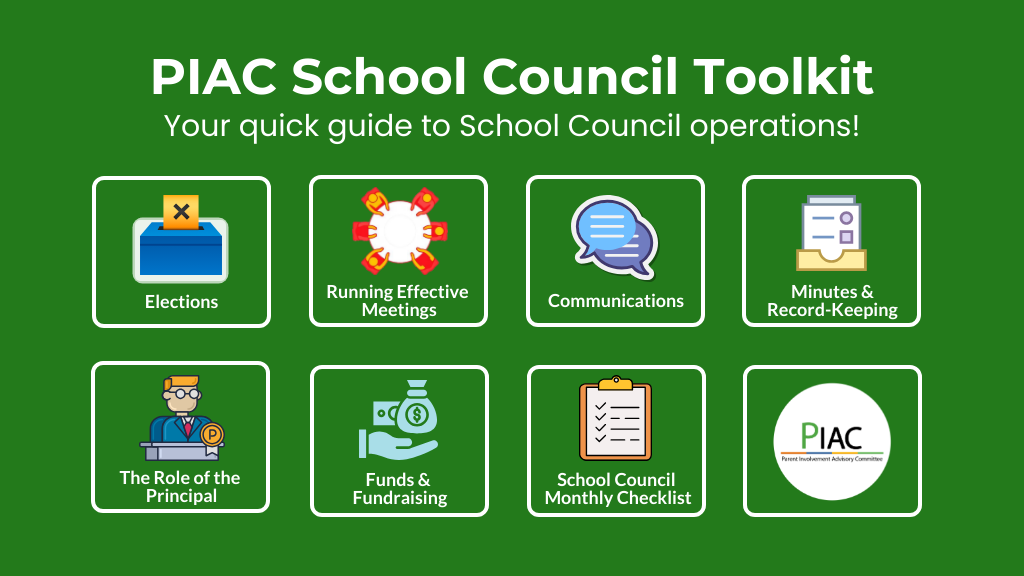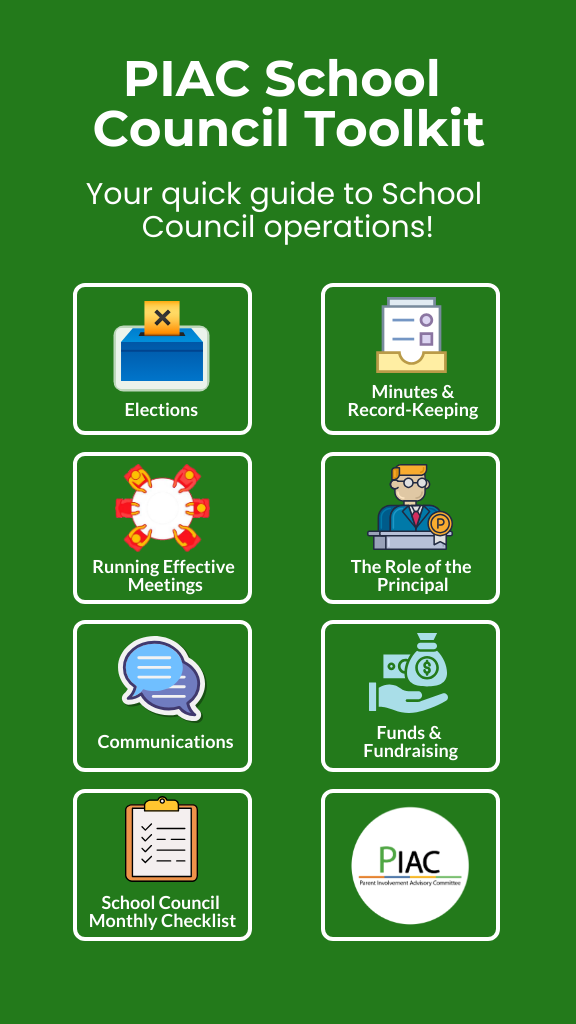School Council Resources
What your School Council needs to know.
Understanding The Purpose of School Council
School Councils play a vital role in the education system in Ontario. They provide a forum through which parents, school staff, students, and other members of school communities can contribute to improving student achievement and well-being, and enhance the accountability of the education system. Ontario Reg. 612
The purpose of School Councils is to improve pupil achievement and to enhance the accountability of the education system to parents. School Councils are able to make recommendations to their Principals and School Boards on any matter.
Principals and school boards, in turn, must consult with School Councils on a variety of matters that affect student learning. They must also consider recommendations made by School Councils and report back to the councils on their advice.
It is important that your School Council establishes priorities and sets goals that focus on student success. A comprehensive guide to effective practices for School Councils can be found in the Ontario Ministry of Education's handbook: School Councils: A Guide for Members.
The purpose of a School Council is to:
- Advise the Principal regarding educational priorities and student achievement areas of need
- Hold the education system accountable to parents
A priority of the Council is to communicate and consult with parents about matters under consideration by the School Council and encourage the participation of parents in the education system. Recommendations made to the Principal (and school board) should reflect the general consensus of the parent community and the well-being of all students.
Help the Principal and staff develop the School Improvement Plan (SIP) (PDF, 2.4 MB). Every school will develop equity embedded goals for the SIP in the following areas: Achievement, School Belonging/Well-being, Thriving and Indigenous Education & Sovereignty.
Foster mutual respect and collaboration amongst members including Parent Members and school staff.
- Communicate and consult with parents regarding matters under consideration by the School Council.
- School Councils are required by O. Reg 612 to develop a set of bylaws that provide mandatory criteria for Elections, Conflict of Interest, Filling Vacancies and Conflict Resolution.
- A School Council must hold at least four (4) publicly accessible meetings per school year. The minutes of these meetings must be recorded and accessible.
- School Councils have regular reporting duties, including reports to the school board and reports to the parent community. To help you get organized please refer to our SC Monthly Checklist.
- Develop and update the School Statement of Needs (SSON) annually. In the event of an upcoming Principal vacancy, the TDSB (your Superintendent) will use the SSON to help find a new Principal who best fits the school's needs. Use this guide to develop an SSON and template for the SSON.
- A School Council must produce an Annual Report of its activities that is distributed to all parents by the Principal. Templates for annual reports can be found in Section 10.1 of School Councils: A Guide for Members.
- School Councils must keep records of all financial transactions (for 4 years). Financial reporting must be included in the council's Annual Report. School Councils that fundraise are required to create and submit an annual financial plan using the TDSB’s form (School Generated Funds Financial Plan and School Needs Assessment Form) and must submit the PSAB Annual Report to their Principal.
- PIAC School Council Toolkit
- PIAC School Council Basics Slide Deck
- School Councils: A Guide for Members
- Ontario Regulations 612/00 and Regulation 298, which set out the legal requirements for and responsibilities of School Councils, boards, and principals
- TDSB Parent and Caregiver Engagement Policy
- Information about the school, the local school board, and the Ontario Ministry of Education
- The School Council’s bylaws and operating procedures
- The School Council’s code of ethics for its members, if your council has one
- The School Profile and School Improvement Plan
More parents are attracted to School Council when the council is a body that supports families. Research has shown that what parents and caregivers do at home is what impacts student achievement. Incorporate some of these ideas into your School Council meeting schedule to build family capacity.
- Invite a teacher to speak at your School Council meeting about education initiatives being used in the classroom
- Invite your school Social Worker to speak about the Mental Health issues most commonly faced at your school
- Support families with Well-Being events (Mental Health workshop, nutrition demonstration, family Yoga Night)
- Host a meeting where the Principal unpacks the Student Census data for parents
- Help parents/caregivers understand school with targeted support events (family Math Night, School Improvement Planning session, Course Selection presentation)
- Organize a school community event (potluck dinner, karaoke night, family dance) that does not involve fundraising
- Use your Social Media platform to build relationships (multi-cultural Recipe Share)
- Ask the Principal to explain the school budget
- Invite your Public Health Nurse to present – a variety of free sessions
Watch this workshop video for an in-depth look at engaging parents/caregivers.
Connecting with parents/caregivers and recruiting new members can be a challenge for any School Council. Take every opportunity to let your families know what you’re doing to support student success.
- Meet and Greet tables at school events (concerts, open houses, parent-teacher interviews)
- Post on school bulletin boards and signs
- Send out email and phone messages on the school's automated messaging system
- Keep council information current on the school website
- Morning coffee or hot chocolate in the schoolyard (kindergarten yard, iWalk or Eco days, at the front doors for orientation days)
- Provide dinner and childminding for School Council meetings
- Develop a list of volunteer roles so parents know what to expect - from small commitments (providing baked goods, volunteering a half hour of time, one-time classroom duties) to larger roles (Council positions, consultations, school committees)
- Speak at school events (new parent orientations (kindergarten, Grade 9), Curriculum Night, school concerts)
- Build home-school relationships by including/inviting staff to participate in your community events.
School Council Planning Calendar 2025/2026
A timeline of milestones and target dates for your School Council.
For a detailed checklist of School Council items you can refer to the SC Monthly Checklist here.

By this date your School Council should have scheduled their first meeting.
Share council information and collect information from the community.

Elections must be held for your School Council within the first 30 days of the school year and the handover process for the new incoming team should be initiated.

- Budget - SC funds & Fundraising Plan
- School Improvement Plan (SIP) - areas of focus

Staffing committee
- Help develop Elementary staffing models
- Understand High School staff allocation numbers

- School Improvement Plan (SIP) review
- Budget review - SC funds spent, SCIG reporting

By June 1, your School Council should be closing out the year end which includes:
- Year-end Evaluation
- Annual Report
- Election planning
School Council Tools
Resources to give your School Council a head start to focus on school matters.
The PIAC School Council Toolkit is your convenient guide to School Council operations. Full of tips and important reference links, plus a monthly checklist to keep you on track, this toolkit is your council companion. Click the image above to go to the toolkit. Or, click on the sections below to go to that page.



